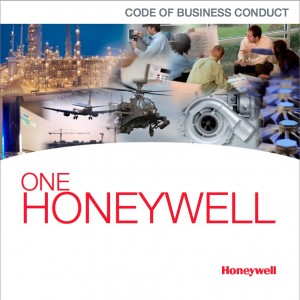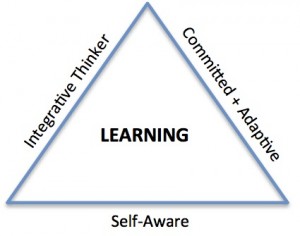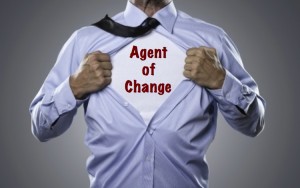How To Create Agents Of Change
Learning is one of the 17 Common Values in business. This value is often referred to as Continuous Improvement or Accumulating Knowledge. Regardless of the label used, the essence of this value is about creating Agents of Change that move a business forward.
But to be an Agent of Change starts with Learning, and Honeywell is one company that seems to have separated this into its different components.
Honeywell is a Fortune 100 company that invents and manufactures technologies in aerospace, automation, performance materials and transportation systems. With over 130,000 employees worldwide, including more than 22,000 engineers and scientists, I’m surprised that the company does not list any values on its website.
 However the company does list 12 Honeywell Behaviors in their Code of Business Conduct document:
However the company does list 12 Honeywell Behaviors in their Code of Business Conduct document:
- Growth and Customer Focus
- Leadership Impact
- Get Results
- Makes People Better
- Champions Change
- Fosters Teamwork and Diversity
- Global Mindset
- Intelligent Risk Taking
- Self-Aware/Learner
- Effective Communicator
- Integrative Thinker
- Technical or Functional Excellence
That’s a lot of behaviors to remember – far too many for most people. But three of the expected behaviors appear to revolve around the same value: Learning. Maybe we can learn something from the way Honeywell defines Learning.
Three Sides of Learning
 Consider the definitions Honeywell provides for three of their stated behaviors (in slightly different order):
Consider the definitions Honeywell provides for three of their stated behaviors (in slightly different order):
- Self-Aware/Learner individuals recognize their behaviors and how they affect those around them. Employees must accurately assess their own strengths and weaknesses and take action to improve.
- Integrative Thinker decides and takes actions by applying intuition, experience, and judgment to the data available. Demonstrates the ability to assimilate various and conflicting information or opinions into a well-considered decision. Understand the implications of individual actions or recommendations on other systems, markets, processes and functions.
- Champions Change requires a continuous improvement mindset to make decisions and take actions that are in the best interest of customers, shareowners, and the organization. It reflects a constant commitment to do things better. It expects individuals to adapt and be supportive of organizational and business change that ensures the long-term strength of our Company, regardless of personal impact.
Note: I prefer the term ‘Agents of Change’ versus ‘Champions Change’ as everyone can contribute to change, but not everyone will lead it.
All of the above are about Learning.
How many leaders struggle with creating a learning organization?
How many companies would love to improve the learning capacity – and outcomes – of their employees?
How many organizations wish they had Agents of Change?
Creating Agents of Change
 Honeywell’s definitions provide some useful insight into creating Agents of Change.
Honeywell’s definitions provide some useful insight into creating Agents of Change.
- It starts with helping employees become self-aware. HOW? Self-Assessment tools, such as DISC, Myers-Briggs, and Strengthfinders, are just a few of the tools that work well. It’s also not a one-time event. This needs to be an ongoing exercise, using new tools to help employees better understand their strengths and weaknesses.
- The next step is to help employees formulate well-considered decisions. HOW? In addition to formal training programs, huge rewards are derived from conducting de-briefings on completed projects and having teams share their learning with others. The best way to make better decisions in the future is to learn from the past and present, from your own work and the work of others.
- Lastly, to improve employee commitment to doing things better, and be adaptive to change, it begins and ends with effective leadership. This is the point where an investment in leadership programs – for ALL leaders in the organization – pays the largest dividends. Commitment comes from trust, and trust must be earned. When employees know that their leaders care about them and have their best interests at heart, then they will be more committed and more open to change then anyone could ever imagine.
When employees experience the benefits of all three sides of learning, there’s no telling what they will be able to accomplish. As Agents of Change, they might even become super heroes for your business!
How else can the value of learning contribute to creating Agents of Change?
What other elements would you add to the value of learning?








